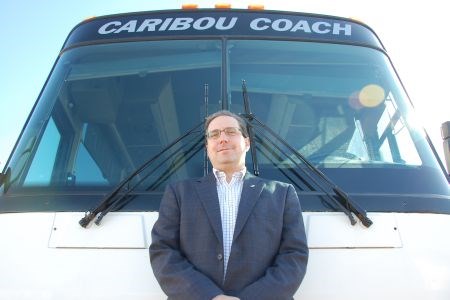A Thunder Bay bus operator wants to make inroads into northeastern Ontario on the heels of the province's decision to divest itself of the assets of the Ontario Northland Transportation Commission (ONTC).
Sandy Smith, owner of Caribou Coach, wouldn't mind expanding his Highway 11 coverage further east into Timmins and along the Highway 101 corridor. He's already sent in his application to the Ontario Highway Transportation Board.
But he has concerns about how the divestment process will work since neither Queen's Park nor a provincially appointed interim transition board has provided any public direction on how Northern communities will continue to be connected with bus service.
Caribou Coach shares 'interline' passengers and parcels with other carriers like Greyhound and Ontario Northland.
The company provides scheduled service on the Highway 11 corridor between Thunder Bay and Hearst, often picking up ONTC bus passengers to continue their journey west.
With the divestment of the Crown assets of the Ontario Northland, there will be some choice bus routes in northeastern Ontario up for grabs.
Smith expects multiple carriers will apply for all or a portion of the more profitable routes. “I'm sure there's going to be a substantial battle for services.”
With 12 employees and six coaches offering scheduled service and charters, Smith would like to diversify his client base and expand his coverage area.
Keeping the company's operating margins in the black has always been a juggling act.
Smith and wife Lori started Caribou from scratch in 2007.
The Thunder Bay-born Smith left a Parliament Hill political job to move back in 2005. While in Ottawa, he drove for Gray Lines on weekends and during summer.
When two miner friends were lamenting the two-hour daily commute to Lac des Iles, north of Thunder Bay, Smith bought his first coach in the spring of 2008 and started a shuttle service until North American Palladium mothballed the mine a few months later.
About the same time, Greyhound was grumbling about low ridership on the unprofitable Fort Frances run and Smith jumped on the route. Less than a year later, Greyhound handed him the Highway 11 run to Hearst.
Over the years, Smith has endured the myriad of challenges in providing vital bus service to isolated northwestern Ontario communities.
The operating expenses of diesel fuel prices and insurance rates are always rising, and drivers always need a cost-of-living increase.
Unlike reservations made for air travel, the coach industry caters to the travelling whims of a largely walk-up crowd of students and seniors coming from outlying areas to Thunder Bay to attend school and for medical appointments.
In its short history, Caribou has made its mark by taking over routes that national carriers couldn't make any money on.
It means endless schedule tweaking that sometimes drops service to some communities from seven days a week to four.
For its Thunder Bay-Fort Frances route, it averages about six passengers aboard its 47-seat highway coaches.
“It's tight, there's no doubt about it. We look forward to peak travel times at Christmas, summer long weekends and our charter services.”
Picking up the former Ontario Northland routes would be a real boon to his business, but clouding the issue is a provincial review underway by the Ministry of Transportation (MTO) about whether to keep economic regulation of bus routes in Ontario.
The licences granted to carriers by the Ontario Highway Transport Board essentially grant monopoly permits to operate scheduled service between destinations.
Doug Switzer, president of the Ontario Motor Coach Association, said at the same time the government made the decision to roll up the Ontario Northland and exit the market, the MTO is investigating whether economic regulation continues to make sense or whether the market should be open to competition.
“Economic regulation is a complicating factor,” he said. “The ONTC operated under that regime and has the monopoly on those eastern routes.
“Until the government makes a decision on economic regulation, it is confusing.”
Alberta switched to a deregulated market last summer to mixed reviews. Some communities lost service, others gained. Manitoba is moving to deregulation on July 1.
For the charter service in northeastern Ontario, Switzer said the ONTC will likely exit the marketplace and a private operator will fill the space.
The scheduled service is more difficult to figure out.
“I'm loath to tell someone in these towns that each and every one will be serviced by the private sector. I'm overly optimistic that much of the service will be picked up if it's profitable and fits existing business patterns for operators.
“The problem is we don't know what we're getting because we don't know if it's going to be a free or regulated market.”




